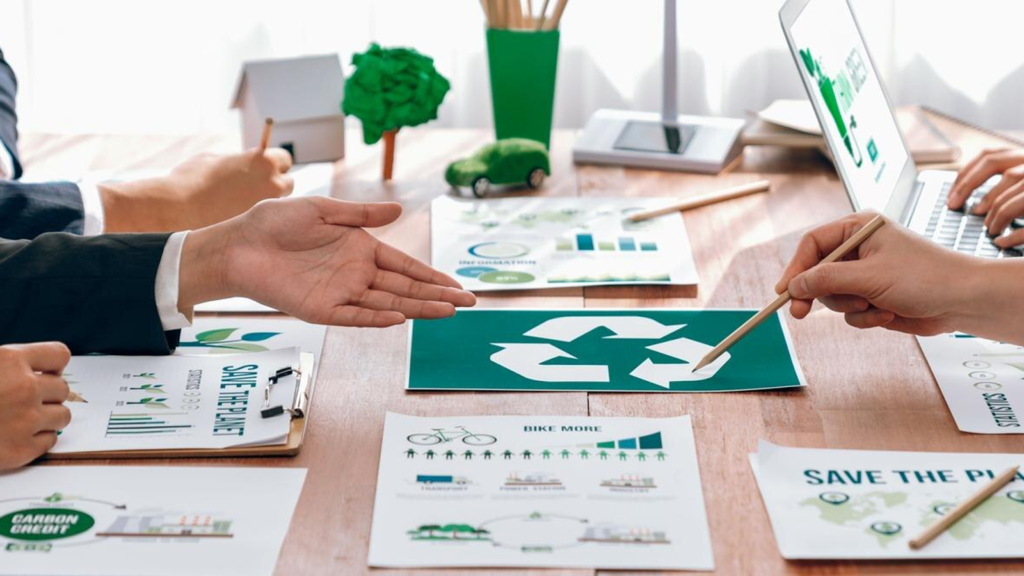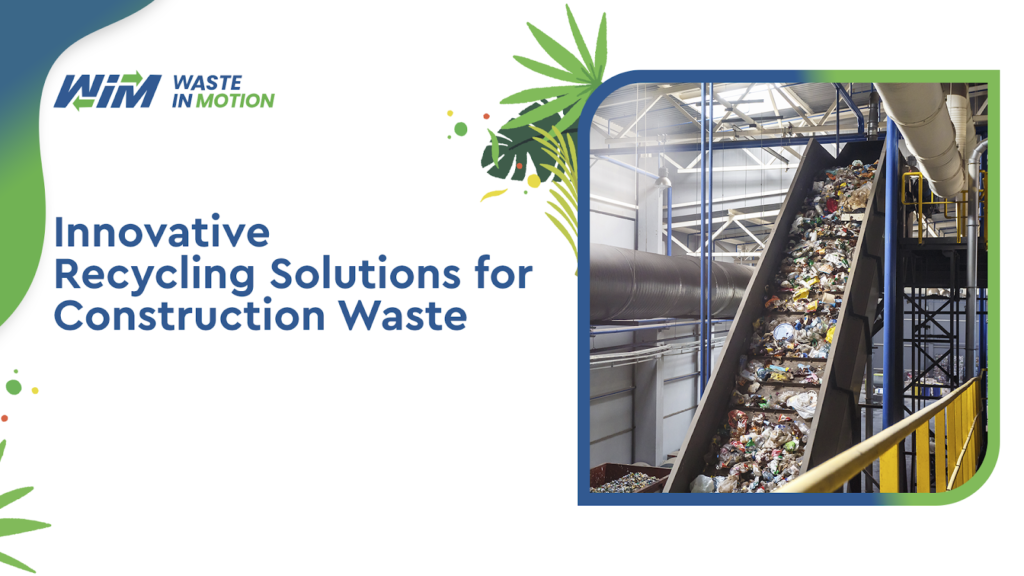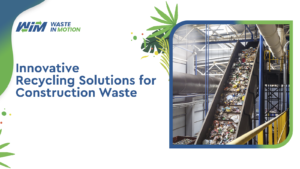Table of Contents
ToggleThe Rising Challenge of Construction Waste
The construction industry is one of the largest producers of waste worldwide, contributing to landfills, pollution, and unnecessary resource depletion. As cities expand and infrastructure projects grow in scale, the amount of construction debris generated each year continues to climb. However, this challenge also presents an opportunity: the chance to adopt innovative construction waste recycling practices that not only reduce the environmental impact but also drive economic efficiency.
Recycling construction waste is no longer just a buzzword—it’s a necessity. Whether it’s scrap metal, wood, drywall, or concrete, much of what’s discarded can be reclaimed and repurposed. By rethinking how construction waste is handled, builders, developers, and contractors can significantly reduce their carbon footprint and contribute to a circular economy.
Why Recycling Construction Waste Matters
Construction waste is a pressing environmental concern. The materials that pile up on job sites or end up in landfills have a profound impact on natural resources, energy consumption, and pollution levels. For example:
- Recycling concrete and asphalt saves vast amounts of raw materials, such as gravel and sand, and reduces the need for new quarrying.
- Recycled wood can be repurposed into other construction materials, reducing deforestation and resource extraction.
- Gypsum from drywall is highly recyclable and can be turned into new sheets or other products, preventing toxic landfill emissions.
By incorporating sustainable construction waste solutions, companies can help mitigate the strain on ecosystems, conserve resources, and lower overall project costs. Recycling also supports green construction practices, which are becoming more popular and essential in the industry today.
Common Types of Recyclable Construction Materials
Understanding the types of materials you’re dealing with is the first step in creating an efficient and effective recycling plan.
Construction and demolition waste often consists of a mix of materials. The good news is that many of them can be recycled. Some of the most common recyclable materials in the construction industry include:
- Concrete: Crushed concrete can be reused for new construction projects, as road base material, or even in new concrete mixes.
- Asphalt: Old asphalt is commonly milled and reused in new paving projects or as a base for new road surfaces.
- Wood: Scrap wood can be recycled into mulch, biomass fuel, or even reprocessed for reuse in new building materials.
- Drywall: Recycled gypsum from drywall can be converted into new drywall products or used in agriculture as a soil amendment.
- Metal: Steel, copper, and aluminum are some of the most valuable materials that can be salvaged and melted down for reuse in new projects.
On-Site vs. Off-Site Recycling: Which One’s Better?
When it comes to construction waste recycling, contractors and project managers must choose between on-site recycling and off-site recycling. Both methods offer distinct advantages, and the right choice depends on the scope of the project, available space, and resources.
- On-site recycling involves sorting and processing materials directly at the construction site. This can reduce transportation costs, lower the project’s carbon footprint, and speed up waste management. For example, concrete crushers or mobile shredders can process waste materials quickly and efficiently, allowing for immediate reuse.
- Off-site recycling involves transporting waste materials to specialized recycling facilities. These facilities can process materials in larger volumes and may have more advanced technologies for handling complex waste streams. This method can be more appropriate for larger projects or materials that require specialized treatment, such as hazardous waste.
To better understand the logistics of on-site waste handling, check out our roll-off dumpster bin rentals—an essential part of many successful construction recycling programs.

Innovative Technologies Transforming Construction Waste Management
Advancements in technology are reshaping the way the construction industry handles waste. Innovations in machinery, sorting systems, and digital tools have made recycling more efficient and accessible. Here are a few game-changers in construction waste recycling:
Mobile Recycling Units and Crushing Equipment
Mobile recycling technology is one of the most significant innovations in construction waste management. Mobile crushers, shredders, and screeners allow construction teams to process materials like concrete, asphalt, and wood directly on the job site. This on-the-spot recycling eliminates the need for transporting waste to distant recycling facilities, saving both time and resources.
You can explore how emerging tech is shaping the waste industry in our article on the role of technology in modern waste management.
Recycling Concrete, Asphalt, and Drywall
Concrete recycling is one of the most successful forms of construction waste recycling. Concrete can be crushed and reused for base material, reducing the need for new aggregate. Similarly, asphalt recycling allows contractors to reuse old asphalt in new paving projects, creating a more sustainable cycle. Drywall recycling may not be as widely practiced, but advancements in processing technologies are making it more common. For example, drywall waste can be shredded and used in agricultural applications or turned into new drywall products.
Smart Sorting Systems and AI-Driven Recycling
The integration of AI-driven recycling systems is revolutionizing how construction waste is sorted. These systems use sensors, robotics, and artificial intelligence to automatically identify, separate, and sort waste materials. Smart sorting technology can process waste much faster and with greater accuracy than traditional methods.
Want to know more about the common hurdles in construction recycling? Here’s a breakdown of key challenges in waste management and how to overcome them.
How to Partner with the Right Waste Management Company
Choosing the right waste management company is key to implementing effective construction debris recycling services. A reliable partner should offer:
- Expertise in recycling construction materials and familiarity with local regulations.
- Access to modern equipment, including mobile recycling units, crushers, and sorting technologies.
- Flexible services that can accommodate your project’s specific needs, whether it’s a small renovation or a large commercial development.
- A commitment to eco-friendly building waste disposal, ensuring that as much of the waste as possible is diverted from landfills.
We’re here to help. Learn more about Waste in Motion’s waste and recycling services and how we support responsible construction across all scales.
Environmental and Economic Benefits of Recycling in Construction
Recycling construction waste offers both environmental and economic benefits:
- Environmental: Recycling reduces the demand for virgin raw materials, helps conserve natural resources, and cuts down on energy consumption. It also reduces greenhouse gas emissions and decreases the volume of waste sent to landfills.
- Economic: Recycling can lower waste disposal costs, save on material costs (by reusing recycled materials), and even create new job opportunities in recycling industries. It can also enhance a company’s reputation as a sustainable and responsible business.

Government Regulations and Incentives for Construction Recycling
Governments around the world are recognizing the importance of construction waste recycling and have started offering incentives to encourage companies to adopt more sustainable practices. Regulations may vary depending on the region, but some common incentives include:
- Tax credits or deductions for using recycled materials in construction projects.
- Recycling mandates that require companies to recycle a certain percentage of construction waste.
- Grants and funding for investing in recycling technologies, like mobile crushers and sorting systems.
For a full list of acceptable recyclable materials and pickup schedules, browse our recycling services overview.
Conclusion: Building a Greener Future One Project at a Time
Recycling construction waste is a crucial step toward building a more sustainable, eco-friendly industry. By adopting innovative recycling solutions, like mobile recycling units, AI-driven sorting systems, and recycled building materials, construction companies can contribute to environmental conservation while also cutting costs and improving operational efficiency.
As the construction industry continues to evolve, green construction practices and sustainable waste management solutions will play an even more significant role in creating a cleaner, greener future. It’s time to embrace the change and make recycling an integral part of every construction project.






